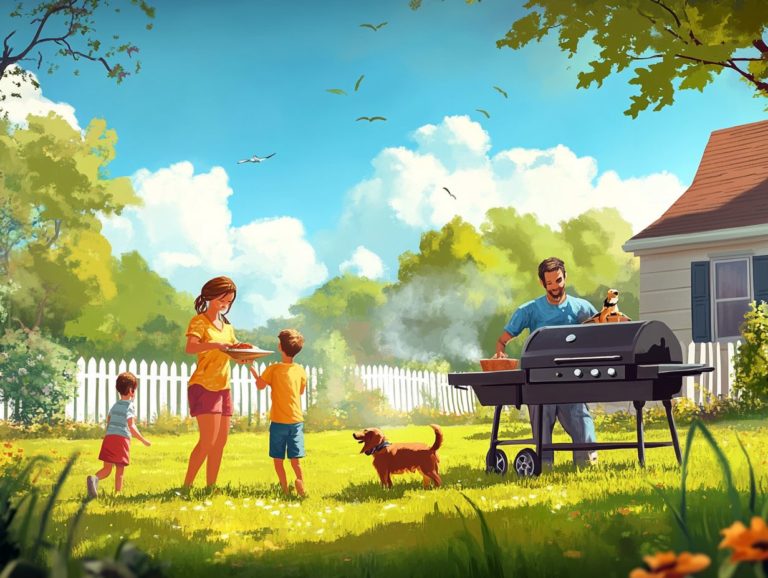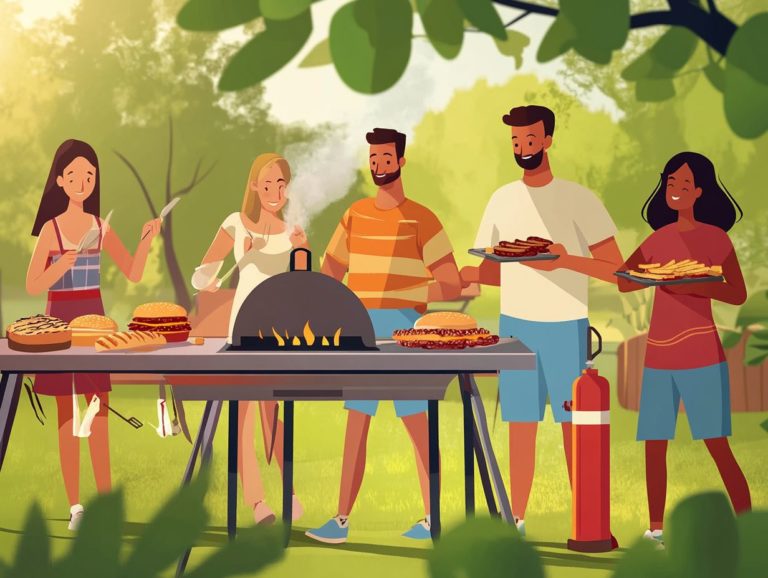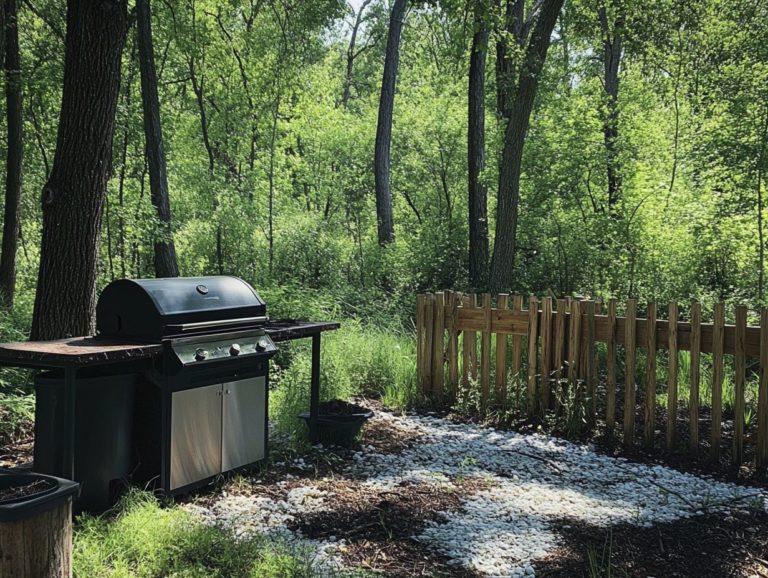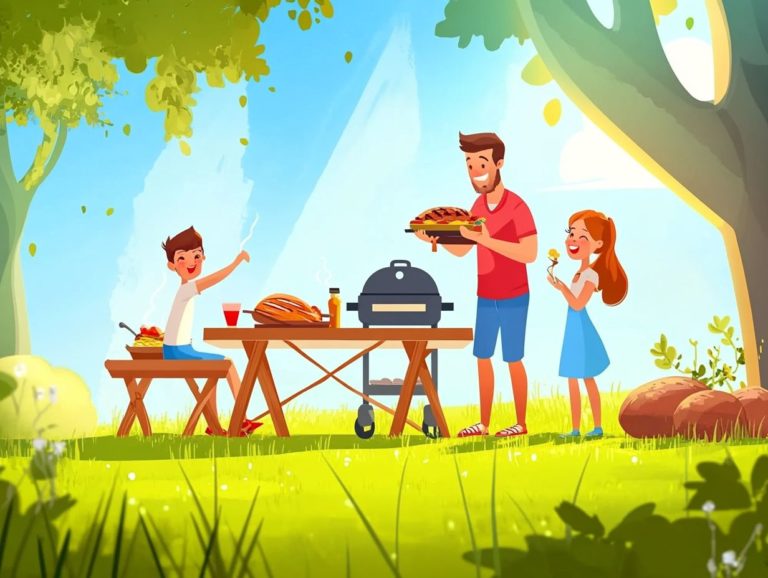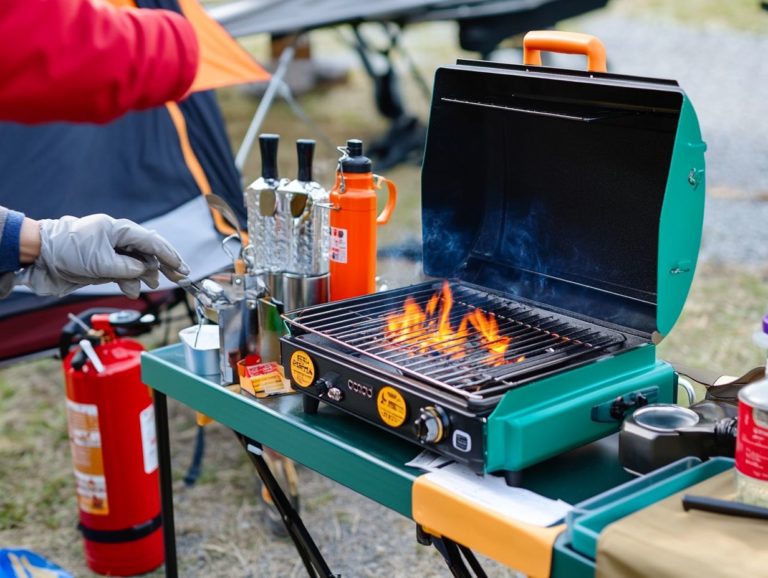5 Tips for Choosing a Safe Campground for Cooking
Planning a camping trip? Picking the right campground is key to an amazing outdoor cooking experience!
Considerations like knowing the rules about fires and ensuring proper food storage and hydration safety are essential for enriching your outdoor culinary endeavors. Get ready! Here are five essential tips you need to choose a safe campground for cooking.
Prepare to elevate your camping culinary adventures to new heights with delicious campfire recipes!
Contents
- Key Takeaways:
- 1. Research the Campground’s Fire Restrictions
- 2. Check for Nearby Water Sources
- 3. Look for a Campground with Bear Boxes or Lockers
- 4. Consider the Availability of Firewood
- 5. Read Reviews from Previous Campers
- What Are the Most Important Factors to Consider When Choosing a Campground for Cooking and Family Camping?
- What Are Some Common Safety Concerns When Cooking at a Campground that You Should Address for Personal Safety?
- How Can One Ensure Their Campfire Is Safe for Cooking?
- What Are Some Essential Cooking Safety Tips for Camping?
- How Can One Properly Store Food at a Campground?
- What Are Some Alternative Cooking Methods for Camping?
- Frequently Asked Questions
- What are some important considerations when choosing a safe campground for cooking?
- How can I ensure that the campground has clean drinking water for cooking?
- Are there any specific safety regulations for cooking at a campground?
- What should I do to keep wildlife away from my cooking area?
- How can I find out if the campground has proper waste disposal facilities?
- Are there any additional tips for choosing a safe campground for cooking?
Key Takeaways:
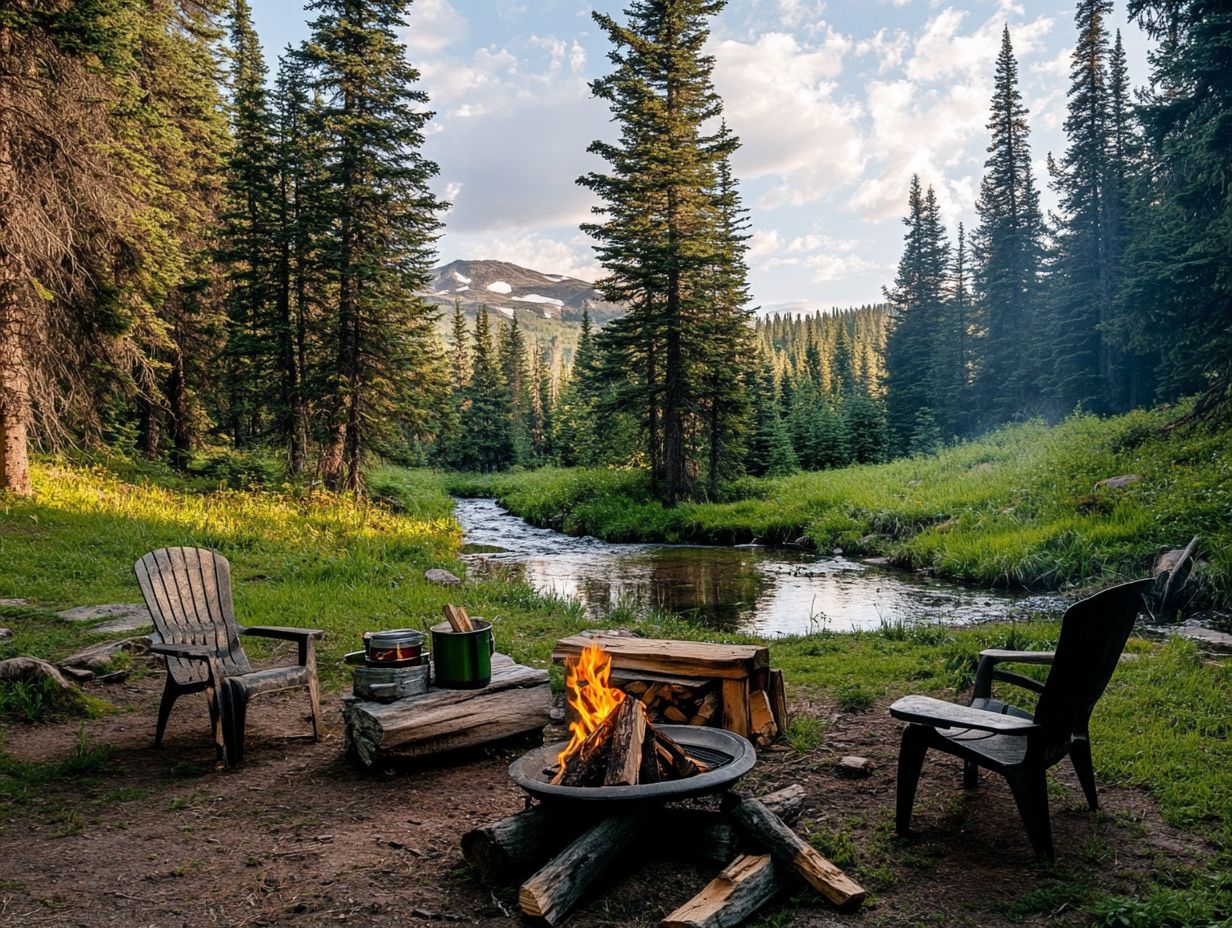
- Research the campground’s fire restrictions to ensure you can safely cook over an open flame.
- Check nearby water sources to meet your hydration needs and support your campsite cooking.
- Look for a campground with bear boxes or lockers to properly store food and prevent unwanted animal encounters.
1. Research the Campground’s Fire Restrictions
Before you embark on your summer camping adventure, it s essential to research the campground’s fire restrictions. This ensures that you comply with local regulations and the safety measures set forth by the U.S. Forest Service.
Understanding these restrictions isn t merely about following the law; it s about ensuring that you and everyone around you can enjoy a safe and memorable experience in nature, especially regarding safety for kids and pets. Campgrounds typically specify certain types of fire pits for campfire cooking, and knowing which ones are permissible is crucial in preventing wildfires.
Being aware of fire extinguishing requirements can protect against unexpected fires that could threaten the surrounding environment and fellow campers, ensuring overall campfire safety. Familiarizing yourself with how to prepare for safe outdoor cooking experiences improves your culinary experience and enhances the overall safety and enjoyment of your campsite.
2. Check for Nearby Water Sources
Check nearby water sources to meet your hydration needs and to support your campsite cooking.
You ll find a variety of water sources at your disposal, including rivers, lakes, and even designated faucets within campgrounds. However, it s crucial to understand the quality of these sources, as not all water is safe for direct consumption. This is where water purification making water safe to drink, often by boiling it or using special tablets becomes paramount.
Employing techniques such as boiling, using water purification tablets, or utilizing filtration systems can make a significant difference in ensuring the water you gather is safe for drinking and cooking, especially when it comes to meal planning. Staying hydrated is vital, especially during outdoor activities that heighten your need for reliable water options and proper sanitation practices at the campsite.
3. Look for a Campground with Bear Boxes or Lockers
Choosing a campground with bear boxes or lockers is crucial for ensuring your food storage safety and minimizing wildlife encounters during your camping experience.
These secure storage solutions not only keep your food safe from bears and other critters but also play a significant role in preserving the natural habitat and the foraging habits of local wildlife. When you’re in areas known for bear activity, making use of these bear boxes is a vital step to avoid potential confrontations.
To further enhance your safety, it s essential to follow proper food storage practices. This means keeping raw and cooked foods separate, practicing food safety, and storing perishables in coolers, all tightly sealed to avoid attracting those curious animals.
Pay attention to these details to reduce risks and enjoy your outdoor adventure!
4. Consider the Availability of Firewood
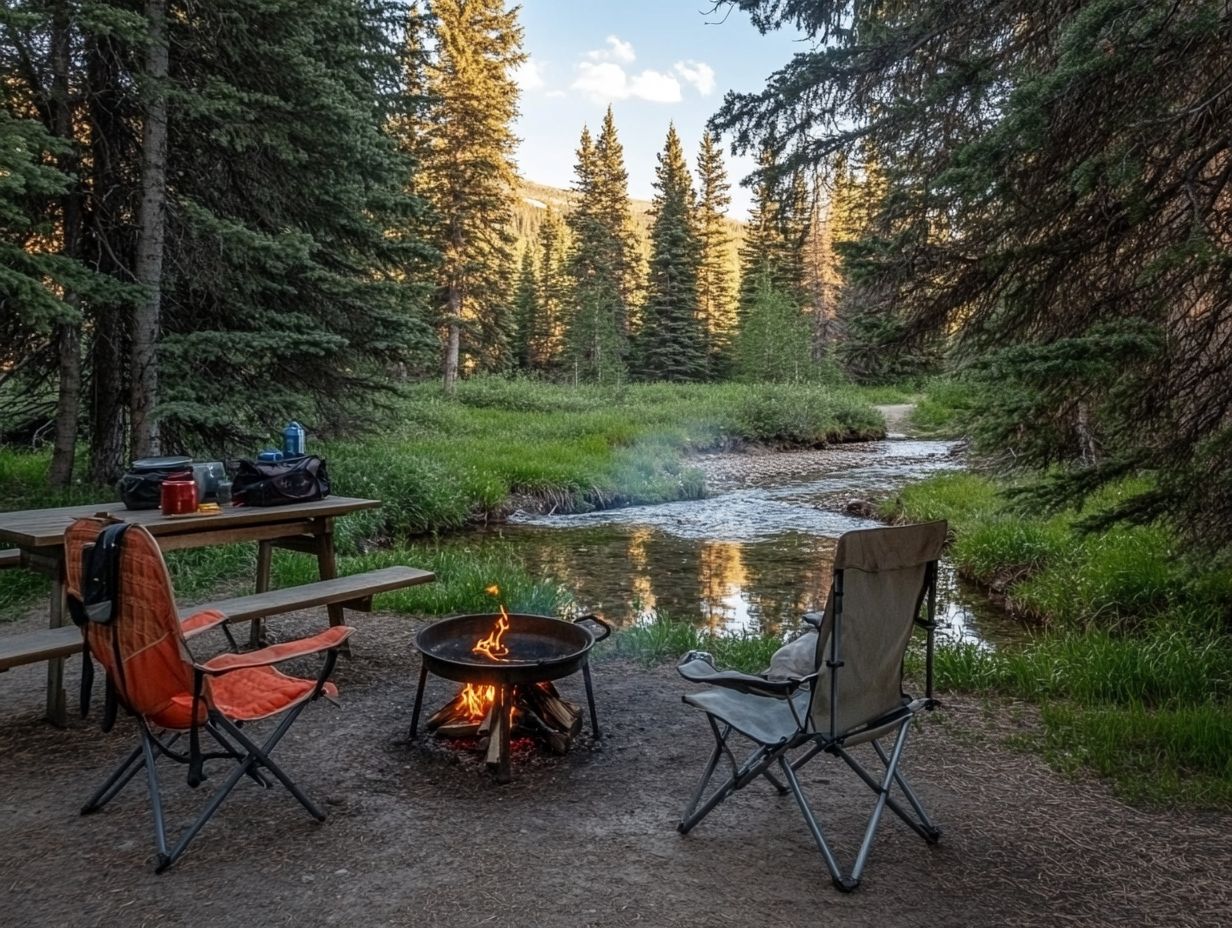
When selecting a campground, considering the availability of local firewood is essential for your camp stove and those mouthwatering campfire recipes you re eager to prepare. Reliable access to firewood can significantly elevate your camping experience, offering warmth and serving as the ideal medium for cooking hearty meals under the open sky.
Make sure to grab local firewood from reputable suppliers. This ensures that you re using seasoned wood that s free from pests, enhancing both safety and flavor in your cooking.
Ample firewood not only facilitates meal preparation but also encourages longer gatherings around the campfire. This helps foster camaraderie among fellow campers and enhances the overall outdoor cooking experience. For safety while cooking, keep flammable materials well away from the flames and choose cookware designed for outdoor use, like cast iron or stainless steel.
Always keep an eye on the fire while cooking, and have water or an extinguisher within reach for emergencies. This ensures you can fully enjoy your culinary adventures outdoors!
5. Read Reviews from Previous Campers
Reading reviews from previous campers provides you with invaluable insights into campground conditions, amenities, and overall personal safety. This is an essential part of your family camping planning.
These reviews often highlight critical aspects like sanitation practices, which can vary widely between locations. You’ll want to ensure that your family can expect clean restrooms and proper waste disposal facilities.
Campers frequently share their experiences with wildlife encounters. This gives you a clearer understanding of what to expect and how to mitigate potential risks. By paying close attention to these details, you can gather essential information that enhances your camping experience.
These insights help you make informed decisions about the best and safest campgrounds tailored to your family’s specific needs. This ensures a healthy journey and proper food storage.
What Are the Most Important Factors to Consider When Choosing a Campground for Cooking and Family Camping?
When selecting the ideal campground for your cooking adventures and outdoor cooking, several key factors should guide your decision. Consider the campsite cooking facilities, meal planning options, and essential safety measures like 5 ways to stay safe while cooking over a campfire, including proper food storage and hydration safety.
A well-equipped campground can elevate your cooking experience, offering amenities such as grills or designated fire pits. These features enhance the flavors of your outdoor meals.
It’s equally important to ensure that food storage solutions, like bear boxes (special storage units designed to keep food safe from animals) or coolers, are available. This helps keep your ingredients fresh and safe from any curious wildlife.
Being organized with your meal planning maximizes your enjoyment and minimizes waste. This allows you to prepare delicious and balanced meals effortlessly.
Prioritize crucial safety practices, such as cooking meats thoroughly to eliminate the risk of foodborne illnesses. Observing wildlife safety ensures you have a fun and worry-free culinary adventure in the great outdoors.
What Are Some Common Safety Concerns When Cooking at a Campground that You Should Address for Personal Safety?
When cooking at a campground, keep common safety concerns in mind. It’s important to focus on food safety practices, understand the risks of mixing different foods that can cause illness, and follow essential tips for outdoor cooking to ensure proper cooking sanitation and ward off foodborne illnesses.
To tackle these issues effectively, use a food thermometer to ensure that meats reach their safe internal temperatures. This helps eliminate harmful bacteria and ensures proper cooking sanitation.
Keep a first aid kit handy for those minor injuries that can happen in the great outdoors. Don t overlook hand hygiene washing your hands with soap and water before handling food and after using the restroom is crucial.
Ensure that surfaces and utensils are sanitized before use. This practice will significantly reduce the risk of illness, allowing you to enjoy a safer and more pleasurable cooking experience while surrounded by nature.
How Can One Ensure Their Campfire Is Safe for Cooking?
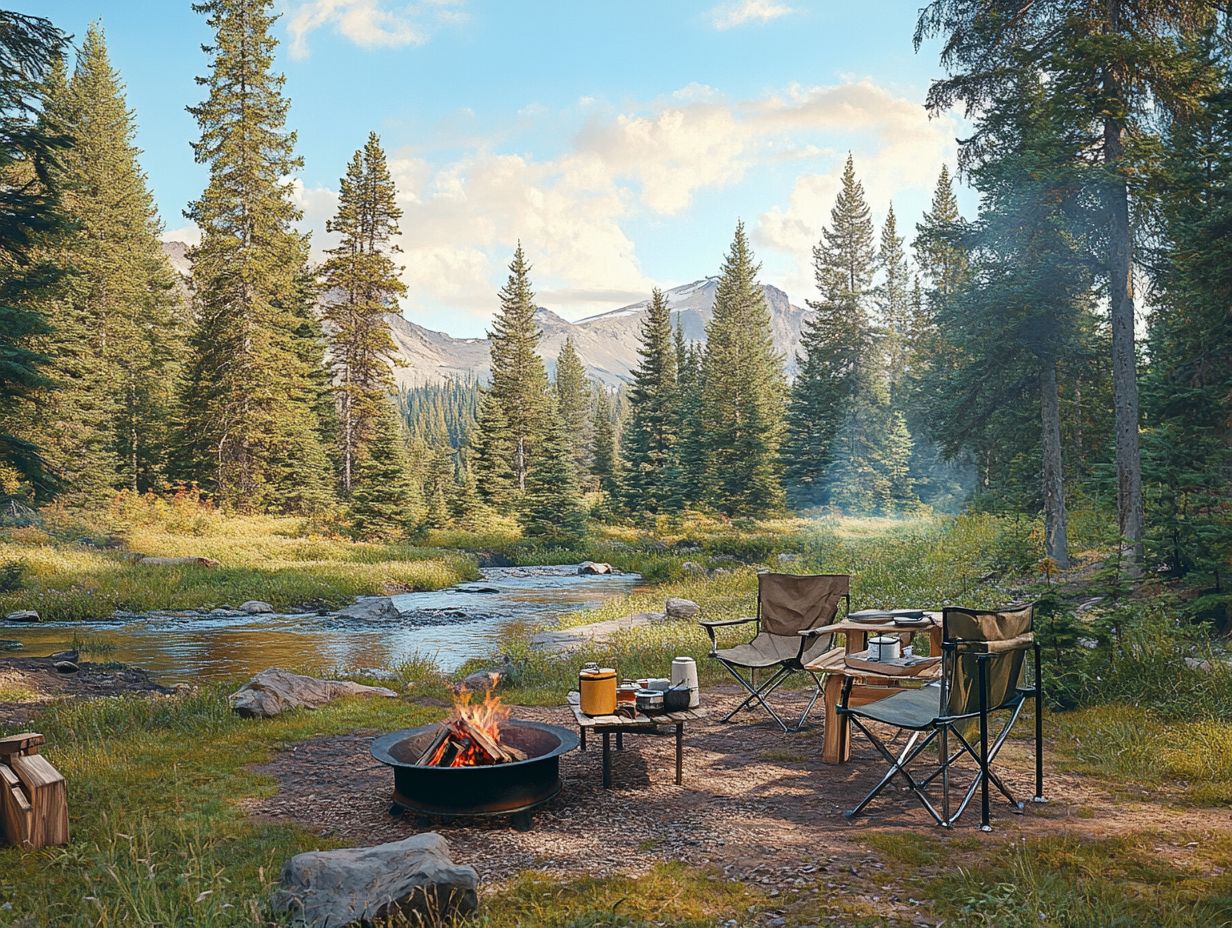
Ensuring your campfire is safe for cooking requires you to follow campfire safety guidelines, utilize a designated fire pit, and understand the proper methods for extinguishing flames. Additionally, it’s crucial to consider 5 tips for outdoor cooking safety during rain to ensure a safe cooking experience.
It s crucial to organize your cooking area thoughtfully to avoid mishaps. Keep food at a safe distance from the flames and ensure hot dishes are maintained at optimal temperatures. To manage heat effectively, consider using cast iron cookware or an iron skillet, or place pots closer to the fire. For cold foods, store them in a cooler packed with ice to prevent spoilage.
In case of an emergency, always have a bucket of water or a fire extinguisher within reach. Keep your emergency contact information handy, and communicate your evacuation plans with your group so everyone knows what to do if something goes awry. For more detailed guidance, check out camping cooking safety. Staying vigilant and prepared transforms your outdoor cooking experience into a safe and enjoyable adventure. Are you ready to elevate your camping meals?
What Are Some Essential Cooking Safety Tips for Camping?
Essential cooking safety tips for camping include mastering the proper use of sharp knives, ensuring that all foods are thoroughly cooked to eliminate foodborne illnesses, and choosing safe cooking equipment for outdoors, as well as keeping a first aid kit on hand for any unexpected mishaps.
Using camp stoves safely is paramount. Set them up on stable, flat surfaces and make sure they are away from any flammable materials. To enhance your outdoor experience, consider following some safety tips for cooking on a budget outdoors. Manage your cooking utensils with care; a cluttered cooking area can easily lead to accidents. Designate specific spots for your pots, pans, and knives to streamline your cooking process and reduce the risk of cuts and burns.
Preparation for emergencies is vital. Assemble a basic emergency kit with a first aid kit, extra supplies, a flashlight, and a whistle to enhance your readiness for the unexpected. Always be aware of your surroundings and familiarize yourself with your campsite’s layout. This ensures a safe and enjoyable outdoor cooking experience while choosing safe cooking locations for outdoor meals and adhering to camp cooking safety guidelines.
How Can One Properly Store Food at a Campground?
Proper food storage at a campground is vital for upholding food safety. Using bear boxes secure containers for food to keep bears away for perishables and ensuring that leftovers are stored correctly will help prevent spoilage.
Familiarize yourself with various food storage solutions, such as portable coolers, airtight containers, and vacuum-sealed bags. These options can significantly enhance freshness and keep contamination at bay.
Make sure all food items and scented products, like toiletries, are securely stored in bear boxes to keep curious wildlife at a distance, ensuring wildlife safety.
Don t overlook hydration safety. Carefully planned water storage and purification methods are essential to ensure your drinking water stays clean and safe throughout your stay. Embrace these strategies for a worry-free adventure!
What Are Some Alternative Cooking Methods for Camping?
Exploring alternative cooking methods for camping can truly elevate your culinary experience. Consider using a camp stove, Dutch oven, or iron skillet to craft delicious campfire recipes that will impress even the most discerning palates.
These techniques not only offer a versatile menu but also invite you to tap into your culinary creativity amidst the splendor of the great outdoors. Picture this: a camp stove effortlessly whipping up a quick saut of seasonal veggies, while a Dutch oven slowly simmers hearty stews or even bakes warm, crusty bread.
Imagine the joy of savoring a flavorful chili on a crisp evening or indulging in decadent s’mores crafted over a sizzling cast iron skillet. Each method brings its own charm, encouraging you to experiment with fresh ingredients and bold spices, infusing gourmet flair into your traditional camping fare.
Frequently Asked Questions
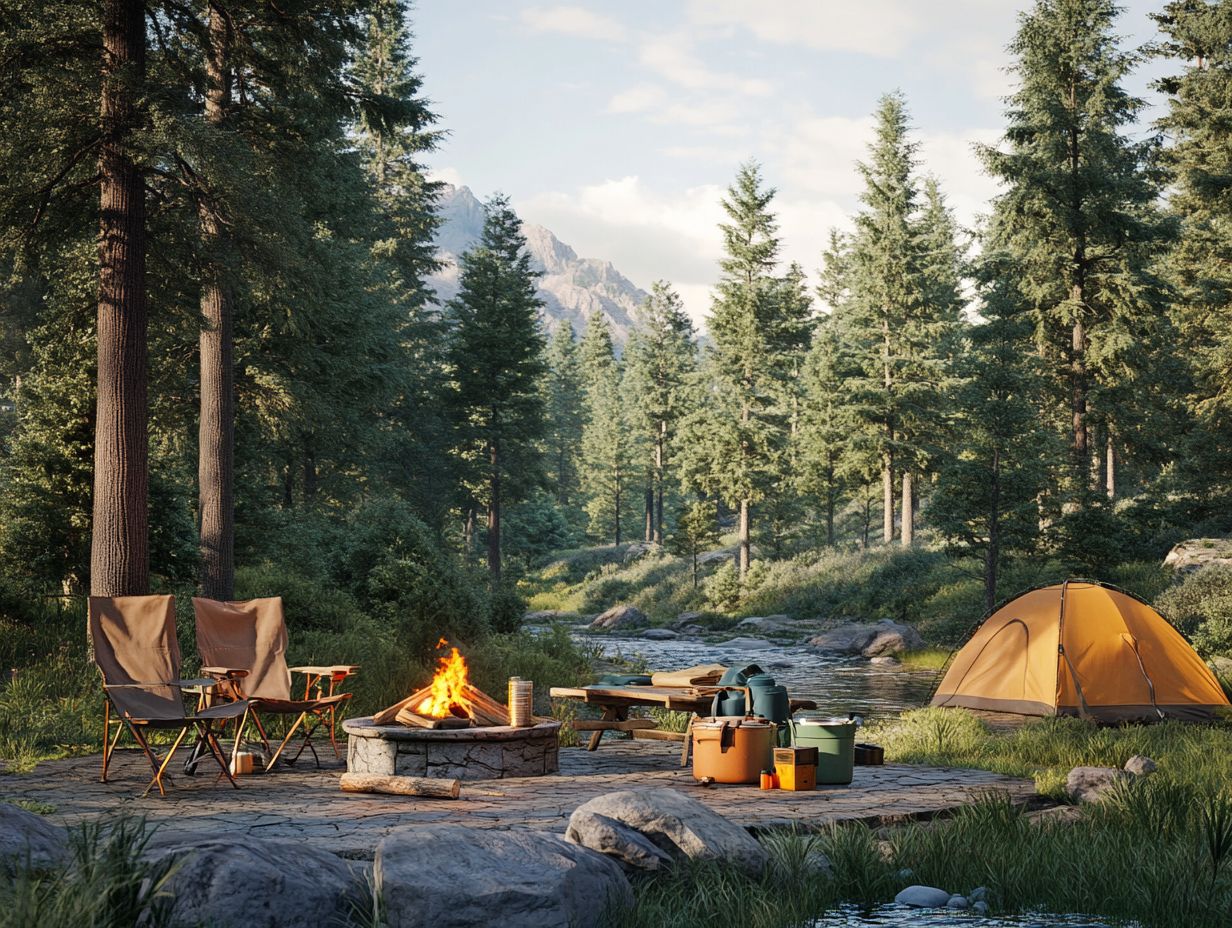
What are some important considerations when choosing a safe campground for cooking?
Some important factors are the availability of drinkable water and fire safety rules. Also, consider how close the campground is to wildlife and whether it has proper waste disposal facilities.
How can I ensure that the campground has clean drinking water for cooking?
The best way to ensure clean water is to bring your own. You can also check with campground management to see if their water is safe for drinking.
Are there any specific safety regulations for cooking at a campground?
Yes, most campgrounds have rules about fire safety. This may include designated cooking areas and restrictions on open flames.
What should I do to keep wildlife away from my cooking area?
Store and dispose of food properly to keep wildlife at bay. Always clean up after cooking and avoid leaving food out.
How can I find out if the campground has proper waste disposal facilities?
You can ask campground management or do some research online. Many campgrounds provide this information on their website or in brochures.
Are there any additional tips for choosing a safe campground for cooking?
Reading reviews is a smart way to choose a campground. Also, make sure to familiarize yourself with the campground rules before you arrive.

